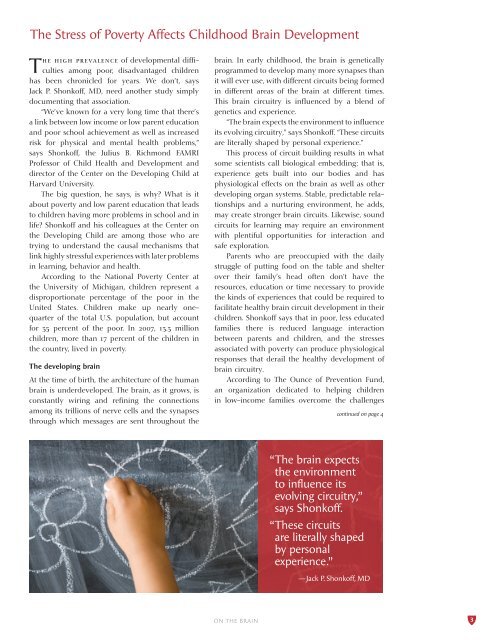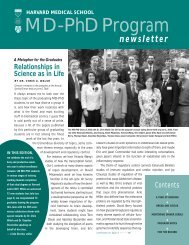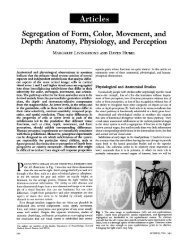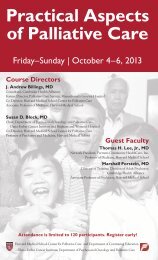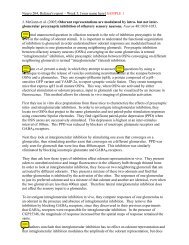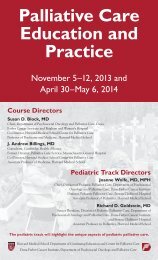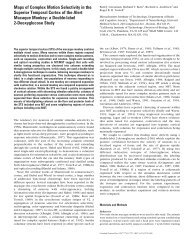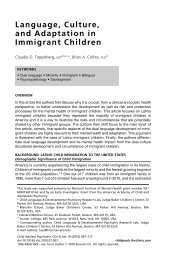on the brain - Harvard Medical School - Harvard University
on the brain - Harvard Medical School - Harvard University
on the brain - Harvard Medical School - Harvard University
You also want an ePaper? Increase the reach of your titles
YUMPU automatically turns print PDFs into web optimized ePapers that Google loves.
The Stress of Poverty Affects Childhood Brain Development<br />
The high prevalence of developmental difficulties<br />
am<strong>on</strong>g poor, disadvantaged children<br />
has been chr<strong>on</strong>icled for years. We d<strong>on</strong>’t, says<br />
Jack P. Sh<strong>on</strong>koff, MD, need ano<strong>the</strong>r study simply<br />
documenting that associati<strong>on</strong>.<br />
“We’ve known for a very l<strong>on</strong>g time that <strong>the</strong>re’s<br />
a link between low income or low parent educati<strong>on</strong><br />
and poor school achievement as well as increased<br />
risk for physical and mental health problems,”<br />
says Sh<strong>on</strong>koff, <strong>the</strong> Julius B. Richm<strong>on</strong>d FAMRI<br />
Professor of Child Health and Development and<br />
director of <strong>the</strong> Center <strong>on</strong> <strong>the</strong> Developing Child at<br />
<strong>Harvard</strong> <strong>University</strong>.<br />
The big questi<strong>on</strong>, he says, is why? What is it<br />
about poverty and low parent educati<strong>on</strong> that leads<br />
to children having more problems in school and in<br />
life? Sh<strong>on</strong>koff and his colleagues at <strong>the</strong> Center <strong>on</strong><br />
<strong>the</strong> Developing Child are am<strong>on</strong>g those who are<br />
trying to understand <strong>the</strong> causal mechanisms that<br />
link highly stressful experiences with later problems<br />
in learning, behavior and health.<br />
According to <strong>the</strong> Nati<strong>on</strong>al Poverty Center at<br />
<strong>the</strong> <strong>University</strong> of Michigan, children represent a<br />
disproporti<strong>on</strong>ate percentage of <strong>the</strong> poor in <strong>the</strong><br />
United States. Children make up nearly <strong>on</strong>equarter<br />
of <strong>the</strong> total U.S. populati<strong>on</strong>, but account<br />
for 35 percent of <strong>the</strong> poor. In 2007, 13.3 milli<strong>on</strong><br />
children, more than 17 percent of <strong>the</strong> children in<br />
<strong>the</strong> country, lived in poverty.<br />
The developing <strong>brain</strong><br />
At <strong>the</strong> time of birth, <strong>the</strong> architecture of <strong>the</strong> human<br />
<strong>brain</strong> is underdeveloped. The <strong>brain</strong>, as it grows, is<br />
c<strong>on</strong>stantly wiring and refining <strong>the</strong> c<strong>on</strong>necti<strong>on</strong>s<br />
am<strong>on</strong>g its trilli<strong>on</strong>s of nerve cells and <strong>the</strong> synapses<br />
through which messages are sent throughout <strong>the</strong><br />
<strong>brain</strong>. In early childhood, <strong>the</strong> <strong>brain</strong> is genetically<br />
programmed to develop many more synapses than<br />
it will ever use, with different circuits being formed<br />
in different areas of <strong>the</strong> <strong>brain</strong> at different times.<br />
This <strong>brain</strong> circuitry is influenced by a blend of<br />
genetics and experience.<br />
“The <strong>brain</strong> expects <strong>the</strong> envir<strong>on</strong>ment to influence<br />
its evolving circuitry,” says Sh<strong>on</strong>koff. “These circuits<br />
are literally shaped by pers<strong>on</strong>al experience.”<br />
This process of circuit building results in what<br />
some scientists call biological embedding; that is,<br />
experience gets built into our bodies and has<br />
physiological effects <strong>on</strong> <strong>the</strong> <strong>brain</strong> as well as o<strong>the</strong>r<br />
developing organ systems. Stable, predictable relati<strong>on</strong>ships<br />
and a nurturing envir<strong>on</strong>ment, he adds,<br />
may create str<strong>on</strong>ger <strong>brain</strong> circuits. Likewise, sound<br />
circuits for learning may require an envir<strong>on</strong>ment<br />
with plentiful opportunities for interacti<strong>on</strong> and<br />
safe explorati<strong>on</strong>.<br />
Parents who are preoccupied with <strong>the</strong> daily<br />
struggle of putting food <strong>on</strong> <strong>the</strong> table and shelter<br />
over <strong>the</strong>ir family’s head often d<strong>on</strong>’t have <strong>the</strong><br />
resources, educati<strong>on</strong> or time necessary to provide<br />
<strong>the</strong> kinds of experiences that could be required to<br />
facilitate healthy <strong>brain</strong> circuit development in <strong>the</strong>ir<br />
children. Sh<strong>on</strong>koff says that in poor, less educated<br />
families <strong>the</strong>re is reduced language interacti<strong>on</strong><br />
between parents and children, and <strong>the</strong> stresses<br />
associated with poverty can produce physiological<br />
resp<strong>on</strong>ses that derail <strong>the</strong> healthy development of<br />
<strong>brain</strong> circuitry.<br />
According to The Ounce of Preventi<strong>on</strong> Fund,<br />
an organizati<strong>on</strong> dedicated to helping children<br />
in low-income families overcome <strong>the</strong> challenges<br />
ON THE BRAIN<br />
c<strong>on</strong>tinued <strong>on</strong> page 4<br />
“ The <strong>brain</strong> expects<br />
<strong>the</strong> envir<strong>on</strong>ment<br />
to influence its<br />
evolving circuitry,”<br />
says Sh<strong>on</strong>koff.<br />
“ These circuits<br />
are literally shaped<br />
by pers<strong>on</strong>al<br />
experience.”<br />
—Jack P. Sh<strong>on</strong>koff, MD


